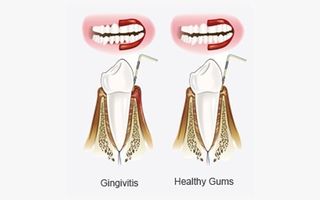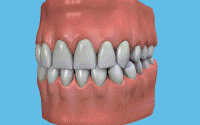Periodontics (gum disease)
Caring for and treating the gums and other supportive structures. If you’ve noticed you have red, swollen gums that bleed when you brush your teeth, it could be a sign that you have periodontal disease.

If you’ve noticed you have red, swollen gums that bleed when you brush your teeth, it could be a sign that you have periodontal disease, a primary cause of tooth loss for adults. Also known as gum disease, when left untreated this infection of your gums can cause major damage to your jaw bone and soft tissue.

Caused by the same bacteria that produce tooth decay, early stage gum disease is usually painless, and many people are unaware they have it. But because periodontal disease can be reversed with good oral hygiene and early treatment, we strongly recommend you visit Apple Dental twice a year, so that we can examine the health of your teeth and mouth, and check for early symptoms of gum disease.
Gum disease treatment
To treat and reverse periodontal disease, start by ensuring your oral health is the best it can be by following a healthy, balanced diet, brushing your teeth day and night with a fluoride toothpaste, and flossing once a day. We may also recommend the use of an antiseptic mouthwash to help prevent plaque formation.
To remove built up tartar from above and below your gum line, the Apple Dental team may use a deep-cleaning method called scaling and root planing. If your gum disease has developed into the more serious periodontitis, we may prescribe a more extensive program of scaling under local anaesthetic, to ensure plaque and tartar are fully removed from the periodontal pockets. By monitoring these pockets over time, we can monitor your treatment and ensure the periodontitis isn’t progressing.
With treatment and advice from a periodontist or gum dentist, in most cases gum disease can be treated, and your mouth restored to its total optimum health to help you retain your teeth for life.
To prevent and treat periodontal disease:
- Visit Apple Dental regularly for a comprehensive search for any gum infection symptoms, including x-rays to help us diagnose any deep gum problems.
- Use an excellent brushing and flossing routine at home to ensure the very best oral hygiene – the most important factor in preventing gum disease.
- Have scaling and root planing from a specialist Periodontist for more advanced cases. This treatment involves scraping off the built up calculus from above and below your gum line, and removing any rough spots on your tooth root (where bacteria live) using root planing.

Can gum disease cause other problems?
Studies have shown that people with gum disease may have a higher risk of developing heart disease or diabetes. The best solution is to seek early treatment for gum disease, to help reduce your risk of tooth loss and prevent other problems from occurring.
Missing teeth
Have you been living with a missing tooth for some time? If so, the loss of a natural tooth can cause severe complications for your surrounding teeth. They may become crooked and overloaded with biting pressure, becoming more difficult to clean and even leading to damage in your jaw joint. A missing tooth root will also cause your jawbone to recede, and if several teeth are lost your bite may lose support, causing your facial muscles to lose their elasticity.
The good news is that when diagnosed early, gum disease is a reversible condition, and your mouth can be restored to total optimum health. For this reason, we recommend you attend regular oral hygiene checkups with Apple Dental at Lane Cove, to allow us to check for early signs of gum disease.
Diet and your oral health
A healthy balanced diet, together with a regular oral hygiene routine that includes brushing twice daily with fluoride toothpaste, and flossing once a day, will greatly contribute to the health of your teeth and gums.
Some of our favourite foods like lollies, chocolate, cakes and soft drinks are the biggest causes of tooth decay. When you consume sugary or starchy foods and sweetened drinks, the bacteria in your mouth produces acid that attacks your tooth enamel. Saliva is your body’s natural defence to this acid, which is why chewing sugar free gum, rinsing your mouth with water and limiting your frequency of sweet and starchy foods can all be effective ways of preventing dental problems.
Frequently asked questions
Periodontal disease, or gum disease, occurs when plaque builds up on your teeth and gums. The bacteria in this plaque then create irritation and infection in your gums, which is known as periodontal disease. If left untreated, over time gum disease will destroy your teeth and bone, causing tooth loss and other problems.
The leading cause of tooth loss in Australian adults, gum disease begins as red, puffy and swollen gums. Caused by the build-up of plaque and bacteria, this inflammation is your body’s natural response to their attack on your gum tissues. While your body fights these bacteria, your gums become seriously affected. Blood flow is decreased, and gum resorption will eventually cause the destruction of the bony support for your teeth. At this stage your gum disease has progressed to a condition known as periodontitis – this is when tooth loss becomes a serious concern.
Gum disease is caused by plaque, a sticky film that naturally forms on your teeth, especially around the gum line. Bacteria thrive in plaque, especially in the gap between your gums and teeth, causing the irritation and infection which is known as gum disease.
If you have any of these symptoms, it could be a warning that you have a serious problem:
- Tender, red, swollen, or bleeding gums
- Loose or sensitive teeth
- Pain when you chew and eat
- Constant bad breath or a bad taste in your mouth
- Receding gums, or teeth which appear longer over time.
Remember, with early treatment, the effects of gum disease can be treated. If you experience any of these symptoms, make an appointment with Apple Dental for a comprehensive examination and treatment advice.
As periodontal disease becomes more severe, the more difficult it becomes to treat. But in many cases we can slow or halt the progression of gum disease with early treatment. For this reason, we strongly recommend you visit Apple Dental regularly, so that we can look for any developing problems.
To slow or halt the progression of gum disease, we recommend you:
- Visit our dental practice for a full examination, including x-rays, to look for any gum infection symptoms and diagnose any deep gum problems.
- Take care to brush and floss properly every day at home, to ensure first-rate oral hygiene. This is one of the most crucial things you can do to help prevent gum disease.
- Have thorough scaling and root planing from a specialist Periodontist, to remove the tartar from above and below your gum line, and eliminate any rough spots on your tooth root where bacteria can live.
Gum disease is the number one cause of tooth loss for Australian adults. Clinical studies have also shown that people with gum disease could have a higher risk of developing diabetes and heart disease. A further link is that people with poor oral hygiene, smokers, those with diabetes, and pregnant women, may have a higher risk of developing gum disease.

